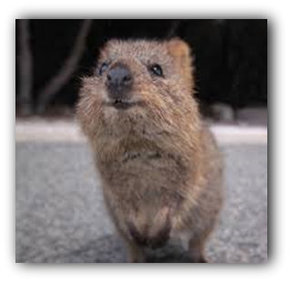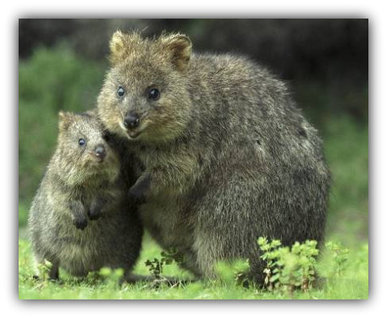
Did you know?
Quokka:
A marsupial native to the island of Rottnest, an area near Perth, Australia, the quokka has been nicknamed “the happiest animal on earth” for its face, which appears to be smiling.
A Dutch man named Willem de Vlamingh came to the island and saw these animals. While not being sure what they were, he wrote that they were rats the size of cats, and named the island Rattenest (rat’s nest), which was later changed to Rottnest.
Quokka:
A marsupial native to the island of Rottnest, an area near Perth, Australia, the quokka has been nicknamed “the happiest animal on earth” for its face, which appears to be smiling.
A Dutch man named Willem de Vlamingh came to the island and saw these animals. While not being sure what they were, he wrote that they were rats the size of cats, and named the island Rattenest (rat’s nest), which was later changed to Rottnest.
The quokka has no natural enemies, and therefore no fear of humans. It is known for being friendly to people.
Like kangaroos, the quokka carries its child, known as a joey, in a pouch. The baby, although interested in looking around wherever it is situated, usually stays close to Mom for 2 months, the previous 6 spent in the pouch suckling.
If placed in a zoo or sanctuary, a quokka can mature to the proper mating age for this environment (one year).
They eat things like plants, bark, and even grass. Using the fat in their tails, quokkas can survive for a while without eating anything and also can go months at a time without water.
Like kangaroos, the quokka carries its child, known as a joey, in a pouch. The baby, although interested in looking around wherever it is situated, usually stays close to Mom for 2 months, the previous 6 spent in the pouch suckling.
If placed in a zoo or sanctuary, a quokka can mature to the proper mating age for this environment (one year).
They eat things like plants, bark, and even grass. Using the fat in their tails, quokkas can survive for a while without eating anything and also can go months at a time without water.
 Unknown photographer
Unknown photographer They are primarily nocturnal, in the sense that they like to be in shaded areas a lot of the time. During the night, however, they go looking for food using tunnels between the grass and plants, allowing them not to be spotted by potential predators.
The quokka can live for up to ten years when not kept in zoos.
Although they are curious and and gentle creatures, visitors to Rottnest are prohibited from handling these animals, and can be fined for touching them.
The quokka can live for up to ten years when not kept in zoos.
Although they are curious and and gentle creatures, visitors to Rottnest are prohibited from handling these animals, and can be fined for touching them.

 RSS Feed
RSS Feed
